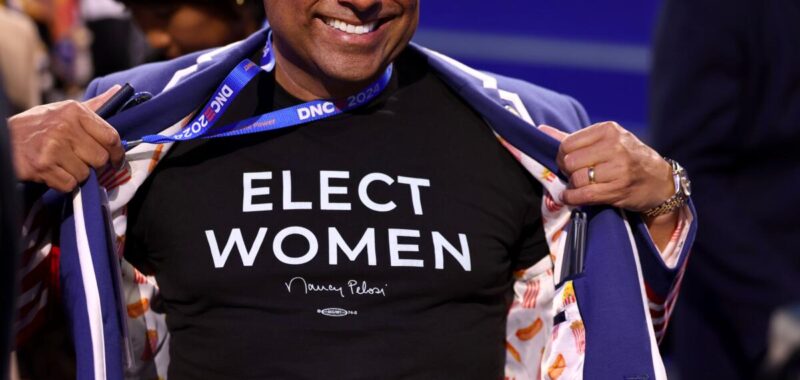
Talk about delicious ironies. In 2016, Donald Trump was propelled into office partly by a racial and cultural backlash to the election of the first Black president, as numerous analyses have noted. But eight years later, he could help elect the second Black president and first woman, thanks to an opposite backlash against his manifest misogyny and racism.
That prospect, amid the enthusiasm for Vice President Kamala Harris that has reshaped the presidential race to Democrats’ advantage, transformed this week’s Democratic convention from a potential wake to a wingding. Thursday night Harris’ caps the celebration with her address accepting the nomination to take on Trump.
Beneath the hoopla, however, there’s plenty of anxiety about November.
Democrats are self-professed bed wetters, suspicious of irrational exuberance. Rightly so. They’re scarred by the outcome in 2016, when they went to bed certain that Hillary Clinton would become the first woman elected president and woke to a nightmare. Now Democrats are asking Americans to elect a woman who’s also Black and Indian American. Not for nothing were they relieved she picked a white-bread white man as her running mate.
For the pessimists, the question of whether voters would elect a woman to be commander in chief, let alone a woman of color, was settled for our time in the negative by Clinton’s defeat. They’re wrong.
Clinton’s experience was a flawed test of whether the country could finally join other developed nations, and some less developed ones, in choosing to be led by a woman. (It’s been 45 years, for God’s sake, since Margaret Thatcher became Britain’s prime minister. But Britain, like some other nations that have had women leaders, is a parliamentary democracy: Thatcher was elevated by her Conservative Party majority, not by voters nationwide.)
Yes, misogyny was a factor against Clinton, including among white women, 52% of whom voted for Trump, according to exit polls. But Clinton was a uniquely polarizing politician. She’d been in national politics for a quarter century by 2016, vilified by Republicans for all of that time. For her own part, Clinton failed to show the humor for which she was known privately. Barack Obama, during their 2008 rivalry, famously damned her with faint praise: “You’re likable enough, Hillary,”
As that exit poll data indicates, Clinton’s groundbreaking candidacy was notable for not galvanizing women voters as much as it should have. She ruefully mused in her 2017 memoir that as she’d watched the massive Women’s March in Washington protesting Trump’s inauguration, “I couldn’t help but ask where those feelings of solidarity, outrage and passion had been during the election.”
Time apparently has reconciled Clinton to her fate. In her convention address on Monday night, the serene elder stateswoman basked in her party’s adulation and implicitly took credit for helping to make Harris’ bid plausible: “Together,” she told her appreciative audience, “we’ve put a lot of cracks in the highest, hardest glass ceiling.”
“Nearly 66 million Americans voted for a future where there are no ceilings on our dreams,” Clinton went on, not adding that her total was nearly 3 million more than Trump’s. “We kept our eyes on the future,” she said. “Well, my friends, the future is here.”
Don’t expect Harris to likewise emphasize her gender, or race, in her address. She hasn’t done so on the campaign trail, just as the record shows she didn’t focus on her “firsts” in her California campaigns. Her attitude seems to be: Let the obvious speak for itself, and then let others — such as Clinton — drive home the point about history. In that approach, she’s more like Obama. “People can see,” former Obama strategist David Axelrod told the Washington Post. Some voters “may feel excluded if you make that focus.”
A number of pre-convention polls provide reason for Democrats to hope, showing Harris taking the lead over Trump nationwide, though within the margin of error, and in most battleground states. Significantly more voters view her favorably now that she’s out front, not in the shadows, and more favorably than Trump, according to an AP/NORC Center poll. Trump continues to be seen among more voters as better able to handle the economy and immigration, while Harris is favored on dealing with abortion policy, healthcare and preservation of democracy.
Critically, she’s drawn more support than Biden was getting from groups within Democrats’ base: female, young and minority voters, especially college-educated and Black women. She is demonstrably better able than Biden to rouse pro-abortion rights voters in this first presidential election since the Trump-infused Supreme Court overturned Roe. But a Pew Research poll showed that she’d also cut Trump’s lead among men in half.
Polls, being snapshots in time, could shift again. But Trump, being Trump, is inadvertently doing his part to help Harris. He is focusing on her gender and racial identity, obnoxiously so, down to juvenile shows of disrespect like calling her by her first name and purposely mispronouncing it. He regularly says she’s “dumb” and suggests she’d be a ”play toy” for foreign leaders. And his allies have dismissed her as “a DEI hire” — including former White House aide Seb Gorka, who said that for Democrats, her winning qualifications were “having a vagina and the right skin color.” Subtle.
Some other Republican allies and Trump’s own campaign advisors wish he’d stop the sexism and race baiting. “Donald Trump, the provocateur, the showman, may not win this election,” South Carolina Sen. Lindsey Graham said on NBC’s “Meet the Press” on Sunday. On CNN on Sunday, New Hampshire Gov. Chris Sununu warned that women would vote “in much bigger numbers” against Trump with Harris now in the race.
Let’s hope so. And Trump-phobic men, too. We know by now that we can count on Trump to ignore his wiser advisors and keep up his schtick. Demeaning women, especially Black women, is what he does. Bring on the backlash.
@jackiekcalmes

